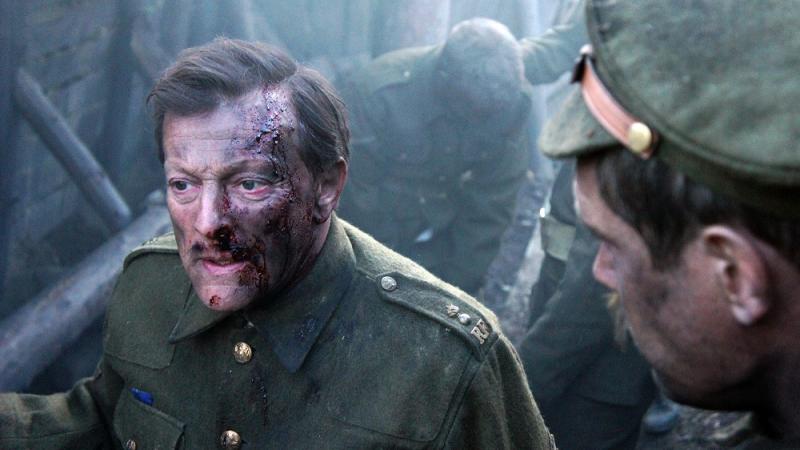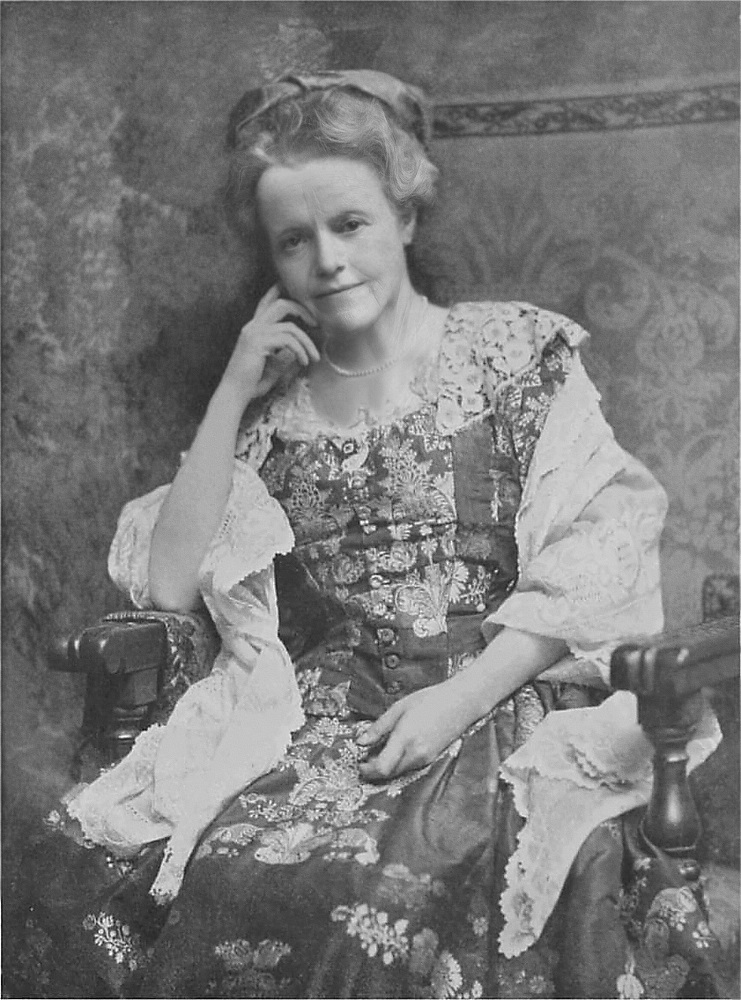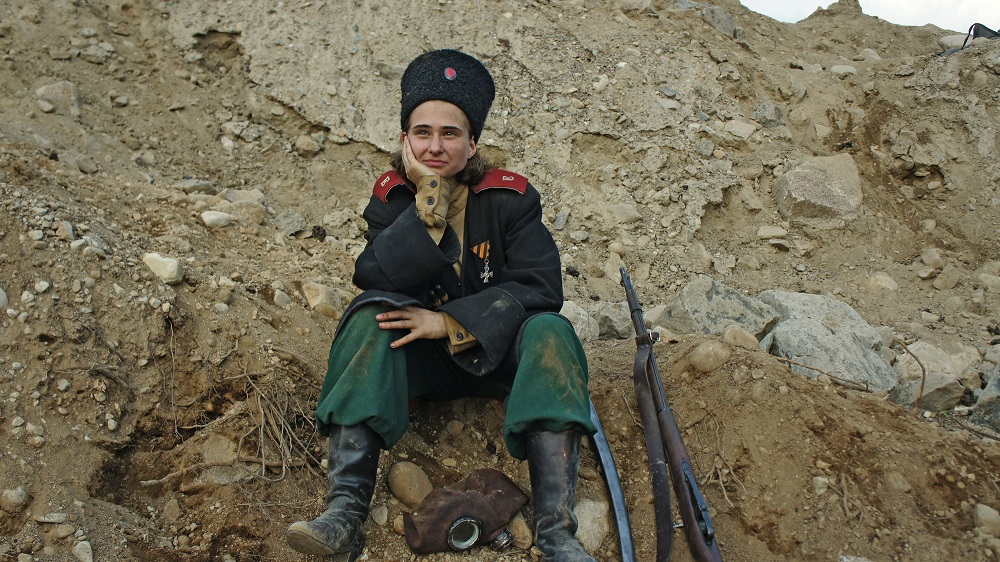Great War Diaries, BBC Two | reviews, news & interviews
Great War Diaries, BBC Two
Great War Diaries, BBC Two
Hybrid pan-European docu-drama on real-life WWI stories doesn't quite cohere

As we approach the anniversary of the beginning of World War I, the television schedules devoted to it are becoming denser and denser. In volume, at least, rather more than insight. We wonder just what more can be broadcast, after all, about the history concerned that has not already been said at some point in the century that has followed the conflict's tragic onset?
Jan Peter’s ambitious Great War Diaries answers two questions that remain relevant, namely, just how did it really feel, and then, what was it like for those on the other side(s)? One of the more impressive programmes we have seen so far this year was I Was There, which reassembled extra hours of interviews with survivors that were not broadcast in the BBC’s classic 1960s The Great War: there’s little that hits home more powerfully than the personal testimonies of those who lived through it. Meanwhile, the closing question of theartdesk’s review of Jeremy Paxman’s Britain’s Great War was whether we could expect to see a similar project brought together around the German experience?
It’s a drama-documentary based on the diaries and letters of real-life protagonists
Given that the centenary is being marked, obviously in very different ways, by the many nations that became involved in WWI, the answer to the latter question is partly presented here. Great War Diaries in some way answers the former one too, since it’s a drama-documentary based on the diaries and letters of real-life protagonists which gives us their words – albeit taken from the page rather than live interview – presented against a visual background that includes extensive and excellent archive material, as well as reconstruction of the events being narrated, presented as fully-fledged, if episodic drama.
Assembled after consideration of more than 1,000 different written war testimonies, the result is a bit of a hodge-podge, though a worthy one. The term “Europudding” is normally used in a derogative manner to define pan-European feature film productions, and Great War Diaries comes close to its television equivalent. A collaboration between 25 international broadcasters, it was brought together apparently on the initiative of Franco-German channel ARTE, with obvious BBC input, on a more than healthy budget of many millions of euros.
 It’s a pudding that can divided in all sorts of ways. Internationally titled 14 - Diaries of the Great War – referring to the number of major testaments dramatised in the fullest treatment – ARTE broadcast it in eight 52-minute episodes. The BBC gives us three series, each of an hour, so only a little more than one third of the original cut. In this BBC version, voice-over diarist reminiscences came in English – sometimes rather over-accented, especially on the Slavic fronts – while dramatic reconstructions (cast with native actors from each territory) were in the original languages and subtitled, a welcome move away from the typical English-language hegemony found in such collaborations. Other countries, including Holland and Sweden, apparently added in supplementary material relating to their own national experience of the conflict.
It’s a pudding that can divided in all sorts of ways. Internationally titled 14 - Diaries of the Great War – referring to the number of major testaments dramatised in the fullest treatment – ARTE broadcast it in eight 52-minute episodes. The BBC gives us three series, each of an hour, so only a little more than one third of the original cut. In this BBC version, voice-over diarist reminiscences came in English – sometimes rather over-accented, especially on the Slavic fronts – while dramatic reconstructions (cast with native actors from each territory) were in the original languages and subtitled, a welcome move away from the typical English-language hegemony found in such collaborations. Other countries, including Holland and Sweden, apparently added in supplementary material relating to their own national experience of the conflict.
We can only wonder where the cuts came in the BBC version, but two of the most prominent witness materials came from British testimonies. One was that of Scottish nurse Sarah Macnaughtan (played by Celia Bannerman; original portrait photograph of Macnaughtan, pictured above right), a Red Cross veteran of the Boer War. (Echoes of the atmosphere from Sarah Phelps’s The Crimson Field came thick and fast, though coincidentally, given the number of years Great War Diaries has been in gestation.) The other was from Charles Edward Montague (David Acton), the Manchester Guardian journalist who lied about his (senior) age to have himself sent to the front, despite the fact that he tells us that he had been essentially a pacifist until the invasion of Belgium by the Kaiser’s army. That initial enthusiam for joining the conflict was felt by many we encountered in the film. Montague survived injuries at the front, and by the end of episode two will have ended up as a discontented sort of army PR attending to visiting dignitaries. By then Macnaughtan will have reached the Russian Caucasus and the Armenian genocide with her brood of volunteer aristo nurses, a sign of just how wide the subject of Great War Diaries stretches.
 That’s before we even begin concentrating on the testimonies of the others, most memorably in this first episode German artist Käthe Kollewitz (powerfully played by Christina Grosse), who sees her young son hurry away from Berlin to a war that everyone is confident will be over by the proverbial Christmas. Or the various experiences of children and young people from Germany, France and elsewhere, dutifully recording it all in their diaries, particularly that of the Cossack girl Marina from Southern Russia (Natalia Witmer, pictured above left), who follows her father to the Ottoman front. Not to mention the plentiful other supporting characters, from the home front as well as the frontlines, who get little more than a name-check and a few words taken from their testimonies.
That’s before we even begin concentrating on the testimonies of the others, most memorably in this first episode German artist Käthe Kollewitz (powerfully played by Christina Grosse), who sees her young son hurry away from Berlin to a war that everyone is confident will be over by the proverbial Christmas. Or the various experiences of children and young people from Germany, France and elsewhere, dutifully recording it all in their diaries, particularly that of the Cossack girl Marina from Southern Russia (Natalia Witmer, pictured above left), who follows her father to the Ottoman front. Not to mention the plentiful other supporting characters, from the home front as well as the frontlines, who get little more than a name-check and a few words taken from their testimonies.
The result is somewhat bewildering, and you have to pay full attention to the screen titles to keep up with just what's happening to who, and where. The acting looks mostly first rate even if some of the characters are given rather little to work with, while Jürgen Rehberg's cinematography is worthy of the big screen, more than matched by Laurent Eyquem's score. Each inter-looping mini-drama had its own power, but that didn’t necessarily add up to a coherent whole. Perhaps, in this truncated British broadcast version, something of the cumulative drama has been lost (what certainy went were the episode titles of the ARTE original, like "The Abyss" and "The Onslaught", which must have given more definition to the viewing experience). Great War Diaries impresses more than it grips the attention, but it does, not infrequently, move.
rating
Share this article
Add comment
The future of Arts Journalism
You can stop theartsdesk.com closing!
We urgently need financing to survive. Our fundraising drive has thus far raised £49,000 but we need to reach £100,000 or we will be forced to close. Please contribute here: https://gofund.me/c3f6033d
And if you can forward this information to anyone who might assist, we’d be grateful.

Subscribe to theartsdesk.com
Thank you for continuing to read our work on theartsdesk.com. For unlimited access to every article in its entirety, including our archive of more than 15,000 pieces, we're asking for £5 per month or £40 per year. We feel it's a very good deal, and hope you do too.
To take a subscription now simply click here.
And if you're looking for that extra gift for a friend or family member, why not treat them to a theartsdesk.com gift subscription?
more TV
 The Count of Monte Cristo, U&Drama review - silly telly for the silly season
Umpteenth incarnation of the Alexandre Dumas novel is no better than it should be
The Count of Monte Cristo, U&Drama review - silly telly for the silly season
Umpteenth incarnation of the Alexandre Dumas novel is no better than it should be
 The Narrow Road to the Deep North, BBC One review - love, death and hell on the Burma railway
Richard Flanagan's prize-winning novel becomes a gruelling TV series
The Narrow Road to the Deep North, BBC One review - love, death and hell on the Burma railway
Richard Flanagan's prize-winning novel becomes a gruelling TV series
 The Waterfront, Netflix review - fish, drugs and rock'n'roll
Kevin Williamson's Carolinas crime saga makes addictive viewing
The Waterfront, Netflix review - fish, drugs and rock'n'roll
Kevin Williamson's Carolinas crime saga makes addictive viewing
 theartsdesk Q&A: writer and actor Mark Gatiss on 'Bookish'
The multi-talented performer ponders storytelling, crime and retiring to run a bookshop
theartsdesk Q&A: writer and actor Mark Gatiss on 'Bookish'
The multi-talented performer ponders storytelling, crime and retiring to run a bookshop
 Ballard, Prime Video review - there's something rotten in the LAPD
Persuasive dramatisation of Michael Connelly's female detective
Ballard, Prime Video review - there's something rotten in the LAPD
Persuasive dramatisation of Michael Connelly's female detective
 Bookish, U&Alibi review - sleuthing and skulduggery in a bomb-battered London
Mark Gatiss's crime drama mixes period atmosphere with crafty clues
Bookish, U&Alibi review - sleuthing and skulduggery in a bomb-battered London
Mark Gatiss's crime drama mixes period atmosphere with crafty clues
 Too Much, Netflix - a romcom that's oversexed, and over here
Lena Dunham's new series presents an England it's often hard to recognise
Too Much, Netflix - a romcom that's oversexed, and over here
Lena Dunham's new series presents an England it's often hard to recognise
 Insomnia, Channel 5 review - a chronicle of deaths foretold
Sarah Pinborough's psychological thriller is cluttered but compelling
Insomnia, Channel 5 review - a chronicle of deaths foretold
Sarah Pinborough's psychological thriller is cluttered but compelling
 Live Aid at 40: When Rock'n'Roll Took on the World, BBC Two review - how Bob Geldof led pop's battle against Ethiopian famine
When wackily-dressed pop stars banded together to give a little help to the helpless
Live Aid at 40: When Rock'n'Roll Took on the World, BBC Two review - how Bob Geldof led pop's battle against Ethiopian famine
When wackily-dressed pop stars banded together to give a little help to the helpless
 Hill, Sky Documentaries review - how Damon Hill battled his demons
Alex Holmes's film is both documentary and psychological portrait
Hill, Sky Documentaries review - how Damon Hill battled his demons
Alex Holmes's film is both documentary and psychological portrait
 Outrageous, U&Drama review - skilfully-executed depiction of the notorious Mitford sisters
A crack cast, clever script and smart direction serve this story well
Outrageous, U&Drama review - skilfully-executed depiction of the notorious Mitford sisters
A crack cast, clever script and smart direction serve this story well
 Prost, BBC 4 review - life and times of the driver they called 'The Professor'
Alain Prost liked being world champion so much he did it four times
Prost, BBC 4 review - life and times of the driver they called 'The Professor'
Alain Prost liked being world champion so much he did it four times

Comments
I was moved by the